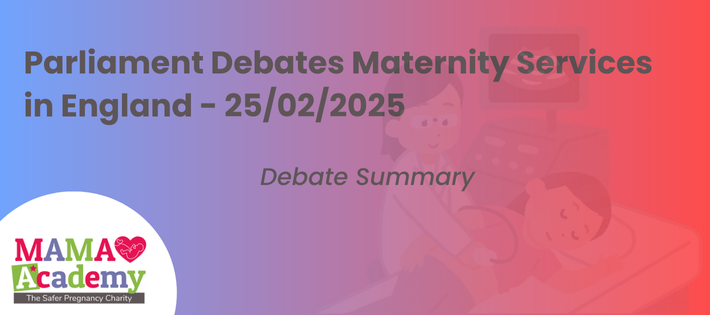Maternity Services Debate 2025 Summary
Published on: 26/02/2025
The recent parliamentary debate on maternity services in the UK has reignited concerns over the safety and quality of care provided to expectant parents. With shocking statistics and stories from bereaved parents, the debate underscored the urgent need for reform.
A System Under Pressure
A recent Care Quality Commission (CQC) inspection found that 65% of maternity units in England were rated as either unsafe or requiring improvement. Moreover, independent investigations—such as the Ockenden Report (Shrewsbury and Telford), the Kirkup Report (East Kent), and the Nottingham maternity inquiry—highlighted recurring failures, including poor staff culture, inadequate staffing levels, and failures to escalate concerns.
During the debate, Jess Brown-Fuller MP (Liberal Democrat, Chichester) emphasized the human cost of these failures, sharing the story of her close friend Steph, whose son Benedict suffered extreme birth trauma, requiring 24-hour care until his passing at age 10. Her story is one of many that reveal how systemic failures in maternity care have long-lasting, life-altering consequences for families.
Staffing Shortages and Burnout
One of the most critical issues raised was the severe shortage of midwives. The Royal College of Midwives (RCM) has warned of a shortfall of at least 2,500 midwives across the NHS. Over 100,000 hours of unpaid overtime are worked weekly, contributing to burnout, staff turnover, and difficulties in retaining experienced professionals. Dr. Beccy Cooper MP (Labour, Worthing West) stressed that without immediate investment in recruitment and retention, maternity services will continue to decline.
The removal of midwifery bursaries in 2017 was also cited as a key factor deterring prospective midwives, leading to financial hardship for those in training. Many MPs called for debt forgiveness programs or alternative funding routes to attract more individuals into the profession and ensure the next generation of midwives are fully supported.
Racial and Socioeconomic Disparities in Maternity Care
Another alarming issue discussed was the racial disparity in maternal health outcomes. According to the MBRRACE-UK report, Black women are 2.7 times more likely to die during childbirth than white women, and those from the most deprived areas suffer neonatal mortality rates twice as high as those in wealthier areas. Dr. Luke Evans MP (Conservative, Hinckley and Bosworth) acknowledged that despite efforts to reduce these inequalities, significant work remains.
The government’s commitment to addressing racial disparities through the Equity and Equality Action Plan is a step forward, but MPs called for greater transparency, national-level accountability, and targeted interventions to reduce these tragic outcomes.
The Litigation Culture in Maternity Services
A striking statistic revealed in the debate is that obstetric negligence claims account for just 13% of total litigation cases against the NHS, but consume nearly 60% of its financial burden—over £1 billion per year. Former Health Secretary Jeremy Hunt MP (Conservative, Godalming and Ash) argued that the fear of legal action discourages midwives and doctors from openly acknowledging mistakes, thereby preventing lessons from being learned and improvements from being made.
MPs called for a review of litigation and whistleblower protections so that healthcare professionals can safely highlight concerns without fear of job loss or prosecution.
Urgent Need for Government Action
While the Government has pledged to address maternity safety, its long-term NHS workforce plan is not expected until summer 2025, leaving many wondering if change will come soon enough. The three-year maternity improvement plan introduced by NHS England aims to increase workforce numbers and enhance perinatal leadership and culture, but there is concern over the slow pace of its implementation.
Among the key demands from MPs were:
-Full implementation of the Ockenden Report’s Immediate and Essential Actions (IEAs).
-Increased funding for midwifery recruitment and training.
-Restoration of midwifery bursaries or introduction of debt forgiveness schemes.
-Improved transparency in CQC maternity inspections and faster intervention in failing units.
-Stronger focus on racial and socioeconomic disparities in maternity outcomes.
A Call for Change
This parliamentary debate made it clear that while progress has been made, it is far too slow, and expectant parents remain at risk. At MAMA Academy, we continue to advocate for the highest standards in maternity care, supporting professionals and parents alike to ensure safer pregnancies and healthier babies.
We urge the government to prioritize maternity services and listen to the voices of parents, healthcare workers, and campaigners demanding change. The time for action is now—because every mother and baby deserve the best start in life.
How You Can Help
– Share this article to raise awareness.
-Contact your MP to demand action on maternity safety.
-Support MAMA Academy’s initiatives to improve maternity care in the UK.
Together, we can create a maternity system that works for every mother and baby, ensuring that every pregnancy is a safer pregnancy.
